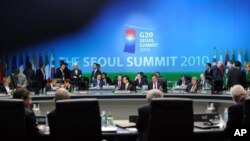Leaders of G-20 nations in Seoul, South Korea are heading for the conclusion of their summit. South Korean President Lee Myung-bak spoke of progress on Friday but offered no details ahead of a G-20 communique to be issued later covering fiscal and monetary policy and other issues.
President Lee's statement about "big progress" achieved by negotiators representing the G-20 nations who worked through the night came at the beginning of a morning plenary session here in Seoul.
In referring to the work of "sherpas" -- the personal representatives of heads of state who do most of the preparatory work at such summits -- he provided no details.
G-20 members have been divided about trade imbalances and large deficits in importing nations such as the United States, as well as surpluses in exporting nations such as China and Germany.
A draft communique at the end of the summit is widely expected to paper over major differences that were highlighted in the run up to this G-20 summit, and will not likely end tensions between members over currency and trade policies.
On exchange rates, a statement is expected to contain language about the need to refrain from devaluation or undervaluation of currencies to achieve competitive objectives, an issue of concern to President Obama regarding China's currency policies.
It would likely call for establishing guidelines to measure imbalances in the global economy, and endorse an approach settled upon by G-20 finance ministers in October that included language urging overall movement toward more market-determined exchange rates.
A final statement would also likely pledge efforts to close the gap between G-20 nations with large trade surpluses and those with big deficits, but would not include specific targets proposed by the United States.
The final G-20 statement will also not call for any specific pressure on China to accelerate the rise in value of the yuan.
The communique will also address efforts to conclude the Doha round of trade negotiations. A Chinese government spokesman said emerging economies should have a stronger voice in international financial institutions, and called for reductions in development imbalances.
At Friday's morning session of the G-20, President Obama entered the conference hall with Russian President Dmitri Medvedev, and was seen speaking with his Treasury Secretary Timothy Geithner, and with Germany Chancellor Angela Merkel, and with President Lula DaSilva of Brazil.
After their morning meeting, G-20 leaders to into a working lunch, and then an afternoon plenary session, before holding a news conference at the conclusion of the summit.
The G20 is also expected to endorse a new system under which the International Monetary Fund (IMF) would develop indicators to identify when imbalances pose a threat to global economic stability.
In some ways this has been a frustrating G-20 for President Barack Obama, who failed to achieve final agreement with South Korea before the summit on a Free Trade Agreement concluded in 2007 under his predecessor George W. Bush.
The president and Treasury Secretary Geithner have also faced criticism over the decision by the U.S. Federal Reserve to pump $600 billion into the U.S. economy.
President Obama had predicted on his arrival in Seoul a broad-based consensus about the direction G-20 nations need to go to avert another global financial crisis, though he acknowledged differences between countries on particular strategies.
G20 Heads for Conclusion




